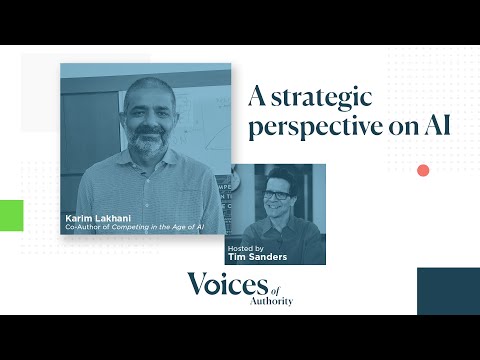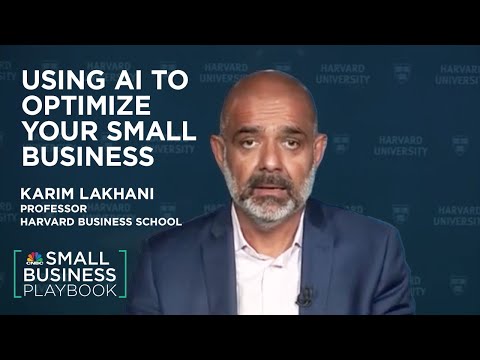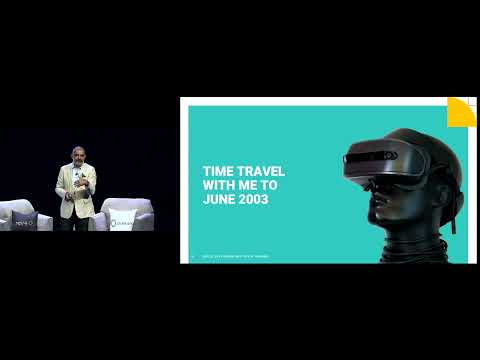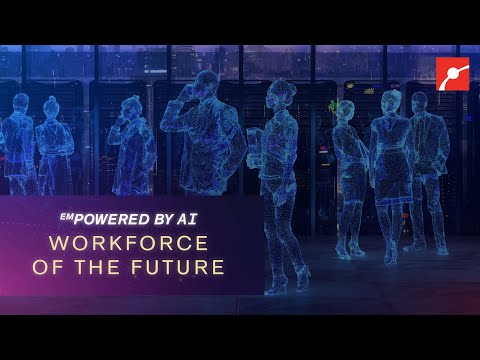Videos
Learn More About Karim Lakhani
Organizations that move from a traditional business model to one driven by artificial intelligence (AI) often become dominating forces in their industry. Harvard Business School (HBS) Professor Karim Lakhani reveals why and how in his critically acclaimed book “Competing in the Age of AI: Strategy and Leadership When Algorithms and Networks Run the World” (2020), co-authored with HBS colleague Marco Iansiti. The book was named Best Business Book of 2020 for strategy by Strategy+Business for its clarity in showing how firms with an AI-first business model are uniquely positioned to thrive long into the future.
While researching and conducting case studies with major firms, including Microsoft, Amazon, Ant Financial, Peloton and Airbnb, Lakhani and his team saw how AI-centric companies were able to break from the constraints of traditional business models to massively increase scope, straddle industry boundaries, and drive more accurate, complex and sophisticated predictions.
During the early stages of the Covid-19 pandemic, Lakhani and Iansiti studied the fast-track development of Moderna’s vaccine. With the help of an AI-first model, the company was able to produce a vaccine candidate in only 41 days — a record 90% reduction compared to the time it took to develop vaccines for SARS and MERS.
“What we’ve seen in the top firms in the world is that AI, analytics and networks are the core of the firm and what they do in terms of their business model and operating model comes from this core,” says Lakhani, who advises organizations on how to transition to an AI-first model. “Our book is not just about platforms or digital transformation, but about a wholesale change in how you define and build or rebuild a company. It’s about how artificial intelligence is changing the landscape of business and the nature of companies.”
Co-founder and co-director of the Laboratory for Innovation Science at Harvard (LISH), Lakhani goes beyond teaching firms how to transition for success to showing workers at every level of an organization – from the C-suite to the front lines – how to think about AI and strategy and what it means for their careers and for the future. He has also played a pioneering role in online executive education by designing the first-ever university-wide program (involving the Business and Engineering Schools and the Faculty of Arts and Sciences), that educates leaders on how to leverage data, analytics and platforms to transform their organizations through the Harvard Business Analytics Program. He also specializes in the management of technological innovation in firms and communities, distributed innovation systems, and the movement of innovative activity to the edges of organizations and into communities.
“Some organizations think machine learning is about superhuman powers that are the exclusive domain of companies like Facebook, Google and Microsoft,” says Lakhani. “The fact is, the AI-first business model is easily accessible to any company. Once they rethink their processes and organize differently, they will see that superpower is available to them too.”
Karim Lakhani is among the world’s leading authorities on AI-driven business transformation. His research has been published in Harvard Business Review, Management Science, Nature Biotechnology, Nature Human Behavior, Organization Science, RAND Journal of Economics, Research Policy and the Sloan Management Review. His co-authored book “Competing in the Age of AI,” was named Best Business Book of 2020 for strategy by Strategy+Business and received the Gold Medal for Best Artificial Intelligence / Robotics / Algorithms Book in the 2021 Axiom Business Book Awards. He is also the co-editor of two books on Open Innovation published by MIT Press “Perspectives on Free and Open Source Software” & “Revolutionizing Innovation”. He has published teaching cases on leading organizations practicing distributed innovation, including 2u, Aston Martin, Data.gov, Google, Myelin Repair Foundation, SAP, Siemens, Threadless, TopCoder, Wikipedia and “X” among many others. His research has also been featured in a number of news publications, including Business Week, The Boston Globe, The Economist, Fast Company, Inc., The New York Times, The New York Academy of Sciences Magazine, Science, The Wall Street Journal, The Washington Post and Wired.
Professor Lakhani is the principal investigator of the NASA Tournament Laboratory at the Harvard Institute for Quantitative Social Science and the faculty co-founder of the Harvard Business School Digital Initiative. Lakhani has extensively studied open source software communities, their unique innovation and product development strategies and how critical knowledge from outside an organization can be accessed through innovation contests. He also investigates incentives and behavior in contests and the mechanisms behind scientific team formation through field experiments. Professor Lakhani is also the co-founder and co-chair of the Harvard Business Analytics Program, a university-wide online executive education program transforming senior executives into data-savvy leaders.
Professor Lakhani has a PhD in management from the Massachusetts Institute of Technology (MIT), a master’s degree in Technology and Policy from MIT and a bachelor’s degree in Electrical Engineering and Management from McMaster University in Canada. He was a recipient of the Aga Khan Foundation International Scholarship and a four-year doctoral fellowship from Canada’s Social Science and Humanities Research Council.
Before coming to HBS, Professor Lakhani served as a Lecturer in the Technology, Innovation and Entrepreneurship group at MIT’s Sloan School of Management. Prior to his academic roles, he worked in sales, marketing and new product development at GE Healthcare and as a consultant with The Boston Consulting Group. He was also the inaugural recipient of the TUM-Peter Pribilla Innovation Leadership Award.
Karim Lakhani is available to advise your organization via virtual and in-person consulting meetings, interactive workshops and customized keynotes through the exclusive representation of Stern Speakers & Advisors, a division of Stern Strategy Group®.
What Every Executive Needs to Know: How AI is Radically Changing the Business Landscape
“AI is the ‘runtime’ that is going to shape all of what we do.” – Satya Nadella, Microsoft CEO
In industry after industry, data, analytics and AI-driven processes are transforming the nature of organizations. While we often still treat AI as the domain of a specific skill, business function or sector, we have entered a new era in which AI is challenging the very concept of how a company is put together. AI-centric organizations exhibit a new operating architecture, redefining how they create, capture, share and deliver value. In this presentation, Professor Karim Lakhani will discuss how reinventing the firm around data, analytics, and AI removes traditional constraints on scale, scope and learning that have hindered business growth for hundreds of years. From Airbnb to Ant Financial, Microsoft to Amazon, research shows how AI-driven processes are vastly more scalable than traditional processes, enabling companies to straddle industry boundaries while uncovering powerful opportunities for learning—to drive ever more accurate, complex, and sophisticated predictions. Professor Lakhani explains why it is important for firms to transition to an AI-centric model in order to thrive in the new economy and highlights how it can be done.
How Covid-19 Accelerated Digital Transformation, Creating New Winners and Losers Around the World
The Covid-19 crisis was an apt illustration of what happens when AI-driven systems experiencing exponential growth collide with traditional systems that cannot move as quickly. In this presentation, Professor Karim Lakhani will explain how such collisions occur and how to avert them with life-saving strategies that involve a clear recognition of the threat, an immediate response and thoughtful planning for long-term transformation. He also outlines how important it is for companies – especially those in health care, retail, transportation, manufacturing, consumer goods, telecommunications and finance – to transition to an AI-centric model to ensure long-term growth and explains how they can make the transition so they are well positioned to thrive during and beyond the pandemic.
The AI Factory: How Analytics Guide and Automate Operational Workflows
The AI Factory is becoming the operational core of most AI-First companies. The AI Factory runs millions of daily ad auctions at Google and Baidu. Its algorithms decide which cars offer rides on Didi, Grab, Lyft, and Uber. It sets the prices of headphones and polo shirts on Amazon and runs the robots that clean floors in some Walmart locations. It enables customer service bots at Fidelity and interprets x-rays at Zebra Medical. In each case the AI factory treats decision making as a science. Analytics systematically convert internal and external data into predictions, insights and choices, which in turn guide and automate operational workflows. In this session, Professor Karim Lakhani will outline the four components that are essential to all AI Factories and show companies how to start building their own so their business can thrive well into the future.
The New Ethics of Digital Scale, Scope and Learning in the Age of AI: Responsibilities and Opportunities for Executives and Managers
AI-driven digital operating models have been shown to exponentially increase the scale of customer reach and interaction, expand the scope of a company’s activities and turbo-charge learning and innovation. At the same time, however, AI systems, if not properly designed, monitored and governed have the potential to raise significant ethical issues that can threaten customer experiences, raise alarm bells with regulators, potentially damage corporate reputations and test the limits of traditional business ethics frameworks and guidelines. In sum, just as AI can enable millions of users to benefit from a company’s products and services, a downside can occur when bias is perpetuated at scale to millions of users. Leaders in modern organizations cannot ignore these challenges, outsource them to the legal group or blame the data science team for the lapses. In this session, Professor Karim Lakhani outlines the five main ethical challenges posed to business and technology leaders and the potential source of these challenges. He identifies the hidden ways these issues can creep into their processes and products and teaches participants how they can implement digital ethics from the ground up. In the process, he outlines the lessons that can be learned from leading organizations who have dealt with these challenges.
Leveraging the Crowd as an Innovation Partner: How Open Innovation Offers a Strategic Advantage
Innovation has become an urgent imperative for established and entrepreneurial organizations. Yet, beyond the buzzwords, most companies struggle with their own innovation efforts. Today, in industries as diverse as fashion design, media, software, life sciences, pharmaceuticals and automotive, the most cutting-edge organizations have started to turbo-charge their product development and customer experiences by embracing open innovation, co-developing with communities and sponsoring contests.
Based on over 20 years of research and hands-on experience in running open innovation programs for NASA, Harvard Medical School, The Broad Institute and many private organizations, Professor Karim Lakhani teaches participants best practices and frameworks for creating open innovation communities, contests and marketplaces. Participants will learn about incentives, structures and processes needed to harness crowds both inside and outside of their enterprises, as well as the benefits and pitfalls of executing open innovation programs.

Competing in the Age of AI: Strategy and Leadership When Algorithms and Networks Run the World
(Harvard Business Review Press, January 2020)

Navigating the Jagged Technological Frontier: Field Experimental Evidence of the Effects of AI on Knowledge Worker Productivity and Quality
(Harvard Business School, September 2023)

Setting Gendered Expectations? Recruiter Outreach Bias in Online Tech Training Programs
(Organization Science, May 2023)
AI Bootcamp: Transforming Your Business and Operating Model in the Age of Artificial Intelligence
Over the past decade, advances in AI have rapidly moved from university and corporate laboratories to large-scale implementation in a range of industries, from finance to travel to health care. AI and its related technologies have generated new competitors, enabled tech giants to straddle multiple industry sectors, and created new human-machine work and managerial interfaces that move a range of decision-making activities toward automation. It is also putting pressure on executives to drive organizational transformation so they can build a culture of continuous innovation. During this workshop, Professor Karim Lakhani teaches effective strategies for capitalizing on AI technologies, from business models and organizational design to workforce management, competitive strategy and innovation processes. He also shows participants how to leverage advanced computational technologies so their organization can massively increase value, scope and scale, allowing them to better compete with companies who are already leveraging the best of what AI, analytics and networks have to offer.
Praise for “Competing in the Age of AI”
Gold Medal Winner for Best Artificial Intelligence / Robotics / Algorithms Book in the 2021 Axiom Business Book Awards
Named one of the “Top Ten Technology Books Of 2020” – Forbes
Named a “Best Leadership Book of 2020” by Leadership Now
Named one of the “Best Business Books 2020: Strategy” by strategy + business
Named one of Bloomberg’s “20 Best Books on Business and Leadership”
Named one of 16 New Business Books You Need to Read in 2020 by Inc. magazine
Named one of 16 New Business Books You Need to Read in 2020 by Inc. magazine
“Iansiti and Lakhani have written an important book that explains what’s required to rethink the firm and become an AI-first company. Anyone interested in the impact of AI should read this book.”
“With the rise of our digital economy and artificial intelligence, the landscape of disruption is shifting in remarkable ways. ‘Competing in the Age of AI’ is a compelling and mandatory read for leaders hoping to survive in the new world of business.”
“‘Competing in the Age of AI’ captures the essence of trends we’re seeing across the business landscape: If you’re not leveraging AI and machine learning to guide real-time decision making, you’re on the precipice of disruption from competitors who are.”
“The ethical and business implications of AI are gradually revealing themselves as more and more AIs are plucked from research labs and deployed in the wild. Iansiti and Lakhani’s book is a great foundation for any business professional who hopes to succeed in this evolving environment.”
“This book provides insight into working more effectively with AI experts and better equips executives to make important decisions in their AI journeys.”
“‘Competing in the Age of AI’ provides a road map to some of today’s most important business changes driven by technological advances.”
“‘Competing in the Age of AI’ is important reading for entrepreneurs, investors, and leaders of all companies who hope to maintain and accelerate technological leadership.”
“Iansiti and Lakhani do a terrific job of avoiding buzzword pitfalls and focusing on practical advice on what AI can, and cannot, do to augment any business’s competitive strategy.”








































